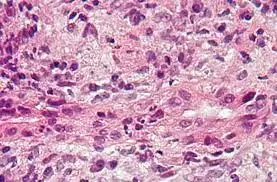- Home
- Medical news & Guidelines
- Anesthesiology
- Cardiology and CTVS
- Critical Care
- Dentistry
- Dermatology
- Diabetes and Endocrinology
- ENT
- Gastroenterology
- Medicine
- Nephrology
- Neurology
- Obstretics-Gynaecology
- Oncology
- Ophthalmology
- Orthopaedics
- Pediatrics-Neonatology
- Psychiatry
- Pulmonology
- Radiology
- Surgery
- Urology
- Laboratory Medicine
- Diet
- Nursing
- Paramedical
- Physiotherapy
- Health news
- Fact Check
- Bone Health Fact Check
- Brain Health Fact Check
- Cancer Related Fact Check
- Child Care Fact Check
- Dental and oral health fact check
- Diabetes and metabolic health fact check
- Diet and Nutrition Fact Check
- Eye and ENT Care Fact Check
- Fitness fact check
- Gut health fact check
- Heart health fact check
- Kidney health fact check
- Medical education fact check
- Men's health fact check
- Respiratory fact check
- Skin and hair care fact check
- Vaccine and Immunization fact check
- Women's health fact check
- AYUSH
- State News
- Andaman and Nicobar Islands
- Andhra Pradesh
- Arunachal Pradesh
- Assam
- Bihar
- Chandigarh
- Chattisgarh
- Dadra and Nagar Haveli
- Daman and Diu
- Delhi
- Goa
- Gujarat
- Haryana
- Himachal Pradesh
- Jammu & Kashmir
- Jharkhand
- Karnataka
- Kerala
- Ladakh
- Lakshadweep
- Madhya Pradesh
- Maharashtra
- Manipur
- Meghalaya
- Mizoram
- Nagaland
- Odisha
- Puducherry
- Punjab
- Rajasthan
- Sikkim
- Tamil Nadu
- Telangana
- Tripura
- Uttar Pradesh
- Uttrakhand
- West Bengal
- Medical Education
- Industry
Seladelpar effectively reduces alkaline phosphatase levels in patients with primary biliary cholangitis

Seladelpar showed dose-dependent efficacy in the reduction of alkaline phosphatase levels in patients with primary biliary cholangitis according to a recent study published in the Journal of Hepatology.
Researchers examined the efficacy and safety of seladelpar, a selective peroxisome proliferator-activated receptor-delta agonist, in adults with primary biliary cholangitis (PBC) at risk of disease progression (alkaline phosphatase [ALP] ≥1.67xupper limit of normal [ULN]) who were receiving or intolerant to ursodeoxycholic acid.
In this 52-week, phase II, dose-ranging, open-label study, patients were randomized (1:1) to seladelpar 5 mg/day (n = 53) or 10 mg/day (n = 55) or assigned to 2 mg/day (n = 11; United Kingdom sites after interim analysis) for 12 weeks. Doses could then be uptitrated to 10 mg/day. The primary efficacy endpoint was ALP change from baseline to Week 8.
Results:
- Mean baseline ALP was 300, 345, and 295 U/L in the 2 mg, 5 mg, and 10 mg cohorts, respectively. Twenty-one percent of patients had cirrhosis, 71% had pruritus.
- At Week 8, mean ± standard error ALP reductions from baseline were 26 ± 2.8%, 33 ± 2.6%, and 41 ± 1.8% in the 2 mg (n = 11), 5 mg (n = 49), and 10 mg (n = 52) cohorts, respectively.
- Responses were maintained or improved at Week 52, after dose escalation in 91% and 80% of the 2 mg and 5 mg cohorts, respectively.
- At Week 52, composite response rates were 64%, 53%, and 67%, and ALP normalization rates were 9%, 13%, and 33% in the 2 mg, 5 mg, and 10 mg cohorts, respectively.
- Pruritus visual analog scale score was decreased in the 5 mg and 10 mg cohorts.
- There were no treatment-related serious adverse events, and 4 patients discontinued due to adverse events.
Thus, Seladelpar demonstrated robust, dose-dependent, clinically significant, and durable improvements in biochemical markers of cholestasis and inflammation in patients with PBC at risk of disease progression. Seladelpar appeared safe and well tolerated and was not associated with any increase in pruritus.
Reference:
Christopher L. Bowlus et al. A phase II, randomized, open-label, 52-week study of seladelpar in patients with primary biliary cholangitis. Published:March 29, 2022DOI:https://doi.org/10.1016/j.jhep.2022.02.033
Keywords:
Seladelpar, dose-dependent, efficacy, reduction, ALP, levels, patients, PBC, Journal of Hepatology, Christopher L. Bowlus, Michael R. Galambos, Richard J. Aspinall, Gideon M. Hirschfield, David E.J. Jones, Yvonne Dörffel, Stuart C. Gordon, Stephen A. Harrison, Andreas E. Kremer, Marlyn J. Mayo
Dr. Shravani Dali has completed her BDS from Pravara institute of medical sciences, loni. Following which she extensively worked in the healthcare sector for 2+ years. She has been actively involved in writing blogs in field of health and wellness. Currently she is pursuing her Masters of public health-health administration from Tata institute of social sciences. She can be contacted at editorial@medicaldialogues.in.
Dr Kamal Kant Kohli-MBBS, DTCD- a chest specialist with more than 30 years of practice and a flair for writing clinical articles, Dr Kamal Kant Kohli joined Medical Dialogues as a Chief Editor of Medical News. Besides writing articles, as an editor, he proofreads and verifies all the medical content published on Medical Dialogues including those coming from journals, studies,medical conferences,guidelines etc. Email: drkohli@medicaldialogues.in. Contact no. 011-43720751


